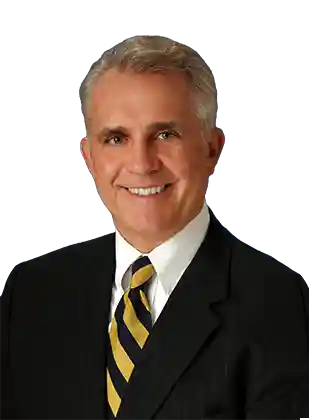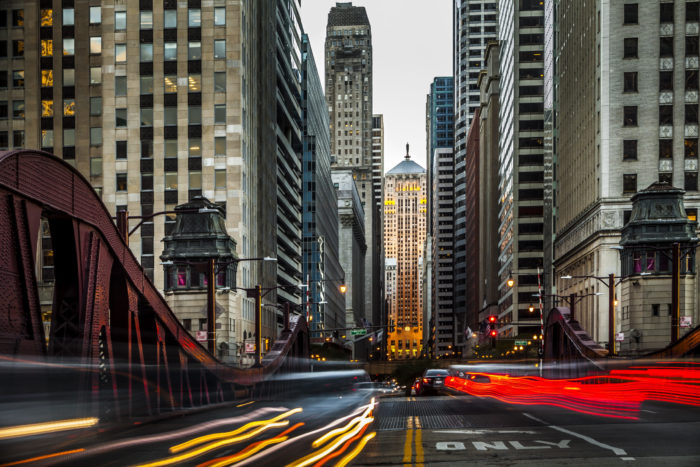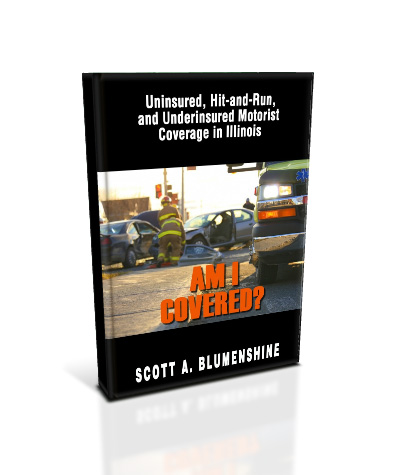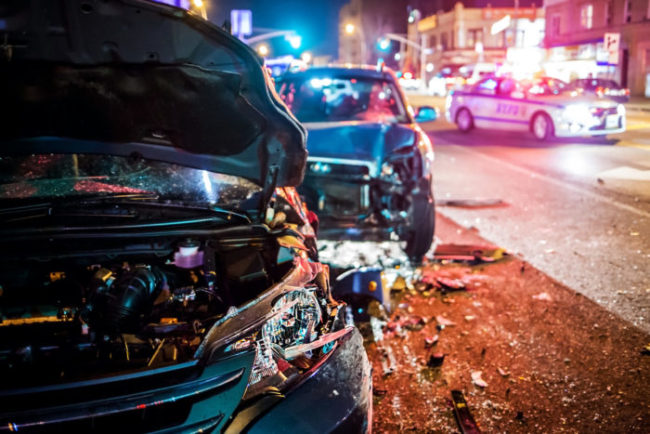We’re a Chicago personal injury law firm experienced in car accident lawsuits.
Chicago is a big city with busy roads and highways that, when combined with the poor driving of others, make car accidents a common occurrence. After a car accident in Chicago, injured parties come to our team of experienced Chicago car accident lawyers for help. Our job is to find the best strategy for our injured clients to receive the Maximum Recovery in the Minimum Time™.
This page contains important information about our legal services, car accident-related laws in Chicago, and answers to some other frequently asked questions for car accident cases.
We Litigate All Forms of Car Accidents: Common Types and Causes
Car accidents encompass a wide range of collisions and vehicles – ranging from rear-end collisions to head-on collisions. We handle all types of accidents involving motor vehicles, including any combination of:
The list of common causes of a motor vehicle accident is not exhaustive, but we regularly see cases involving:
- Distracted driving
- Exceeding the speed limit
- Use of cell phones
- Failure to follow other traffic laws
- A lack of adjustment for weather conditions
- Alcohol
- Unsafe vehicles (e.g., faulty brakes, nonfunctioning headlights, etc.)
Of course, we always welcome an opportunity to work on car accident cases regardless of the cause, beginning with our free consultation.
About Us – Our Client Services Pledge
Our firm’s client service pledge drives every action we take in representing clients in their car accident-related personal injury claims. Our proven track record of success is the result of the efforts taken under our client services pledge, which incorporates the following:
- Answer your questions and address your concerns. Our injured clients usually have many questions about their case due to concerns about their health and finances. We work hard to be a reassuring voice that can answer complicated questions in the most uncertain circumstances.
- Have an attorney and case manager assigned to your car crash case. While our Chicago car accident law firm works as a team, we assign one attorney and one case manager to each case, so our clients always have a dedicated point of contact. That way, they know who to go to when questions arise.
- Respond to your calls, emails, and texts within 24 hours. When clients do reach out regarding their case, we make a strong effort to reply within a day.
- Keep you informed on the status of your case. Even if our clients don’t inquire about their car accident case, we commit to providing regular updates – usually after we receive new information or when a settlement offer is made.
- Provide proactive, efficient, and effective legal service. Some parts of a personal injury case can be outside of our control – whether it’s waiting on the court, defendants, insurance companies, investigators, or others. However, our office remains in constant communication and oversees all the moving parts to protect our client’s interests and avoid unnecessary delays.
- Strive to get you the Maximum Recovery in the Minimum Time™. Our trademarked slogan is a simple reminder of the ultimate goal in every case. Our purpose from day one is to maximize our client's compensation for their injury as soon as possible.
Common Types of Car Accidents Defined
Rear-End Collisions
Rear-end collisions occur when a following vehicle crashes into the rear of the lead vehicle, often due to tailgating or distracted driving. The sudden deceleration causes severe whiplash injuries. Rear-end crashes are very frequent, especially in congested urban areas.
T-Bone Accidents
T-bone accidents, also called broadside collisions, happen when one vehicle strikes the side of another vehicle at a perpendicular angle, usually at an intersection. The violent side impact causes serious injuries like crushed limbs, organ damage, and spinal injuries.
Head-On Collisions
Head-on or frontal collisions involve two vehicles crashing front-first into each other in the same lane. Excess speed, overtaking mistakes, and lane departures often cause head-on crashes. Head-on is one of the most dangerous accident types, given the impact force.
Rollover Accidents
A rollover accident occurs when a vehicle tips onto its side or roof after losing control. High-speed maneuvers, edge drop-offs, slick roads, and high centers of gravity increase rollover risk. Ejection upon rolling exposes occupants to more hazards.
Multi-Vehicle Pileups
Pileups are chain-reaction crashes involving three or more vehicles in succession, typically due to rear-end impacts in traffic. Determining liability is complex when pileups block roads. Pileups are frequent on highways in hazardous conditions like ice or fog.
Sideswiped Accidents
A sideswipe accident occurs when the sides of two vehicles collide, often due to one vehicle drifting out of its lane or making an improper lane change. These accidents can cause significant damage and injuries, warranting legal assistance to navigate the complexities of liability and compensation.
Why an Injured Party Might Benefit from an Attorney After a Chicago Car Accident
Most people associate the aftermath of a car accident with the simple exchange of insurance information, followed by an estimate from the claim examiner and eventual payment. Unfortunately, the legal fallout of a car accident can involve a lot more complexity and dealings with adverse parties. The level of complexity and confrontation in a case will depend on the facts (e.g., the number of parties involved, the nature of those parties, and the severity of the injury).
Without proper representation, plaintiffs are susceptible to accepting unfair settlements and other forfeitures of their rights.
Illinois Law for Cases Where Multiple Parties – Possibly Including the Plaintiff – Are at Fault for a Car Wreck
Many car accidents result from the careless actions of more than one person. Sometimes, this person is the injured party (i.e., the plaintiff). To reduce their liability, defendants and their attorneys will quickly look for ways in which the injured party contributed to the accident.
Each state has laws for allocating liability in car accidents where the injured party is also at fault. Illinois law – which applies to car accidents in Chicago – uses a special variation of the rule known as modified comparative fault. Part of our job is identifying all responsible parties and ensuring they pay for their share of the liability in a car accident claim.
Claims Where the Injured Party Contributed to the Accident
Under this rule, an injured party cannot recover compensation from other responsible parties if the injured party was more than 50 percent responsible for the auto accident. For example, this rule might bar an injured driver’s recovery in a case where the negligent driver ran a red light and caused a collision, even though the other driver was also to blame for talking on their phone.
If the injured party is less than 51 percent responsible, their recovery is still reduced by their percentage of liability. In the example above, let’s assume the driver who ran the red light was 75 percent responsible and the driver on their phone was 25 percent responsible. Illinois law would limit the recovery of the driver on their phone by 25 percent (e.g., the driver could only recover $75,000 of a claim worth $100,000).
Claims with Multiple Parties at Fault Who Are Not the Plaintiff
Like cases where the injured party contributed to the accident, Illinois law limits the amount of a responsible party’s liability to their percentage of fault in an accident. For example, if two parties were each 50 percent responsible for an accident, each party would only owe 50 percent of the damages to the injured party.
Injured parties can run into trouble in cases where they settle with one party out of court but must obtain a judgment against another party through trial. Depending on each party’s liability, the settled amount could severely reduce the injured party’s overall recovery. Working with an attorney from the beginning can avoid unfair settlements from one party that don’t align with that party’s level of fault compared to other responsible parties.
Car Accidents Involving Alcohol: Illinois Dram Shop Law
Another complicating factor in a car accident case is alcohol. Depending on the case, liability for car accidents involving alcohol may belong to others in addition to the intoxicated driver. Persons injured in certain alcohol-related car accidents can pursue claims against these parties. Illinois’ dram shop law provides greater clarity on liability in these cases.
The dram shop law creates liability for those who serve alcohol and cause the intoxication of another, who then causes injury because of their intoxication. The law extends liability to parties other than the intoxicated driver in several different contexts:
- Any person licensed to sell or serve alcohol who causes intoxication. This extends to a person licensed in another state who causes intoxication of a driver involved in an accident in Chicago.
- Any person over the age of 21 who pays for the use of a hotel room or other facility for the unlawful consumption of alcohol by others (i.e., someone under the age of 21).
- Any person owning, renting, leasing, or allowing the occupation of a premise who knows that alcoholic liquors are sold on the premises or permits the sale of alcoholic liquors that causes intoxication of others. If the owner is a minor, then that minor’s guardian will be responsible.
Time Limit to File Personal Injury Claims Against Those Who Intoxicated a Driver
An injured party only has one year from the date of events causing injury to file a claim against someone for unlawfully intoxicating another under Illinois’ dram shop law. This is shorter than the standard time limit to bring a claim for personal injury (discussed more fully below).
The statute of limitations is to preserve the evidence required to prove these claims. Most dram shop claims rely on evidence that fades over time (i.e., the testimony of witnesses such as bar patrons and servers).
Again, working with an attorney sooner than later is essential to ensure that all parties liable under the Dram shop law are timely named in the lawsuit. This will avoid the statute of limitations from preventing recovery against irresponsible alcohol suppliers and property owners.
Car Accidents with Commercial Drivers: Employer Liability
Drivers in Chicago share the road with many commercial drivers capable of reckless behavior that can cause a car accident. Car accident injuries are often more devastating because of the vehicles involved (e.g., semi-trucks, vans, and other large vehicles). Additionally, these accidents might involve the spill of toxic chemicals and other dangerous products, causing more serious injury.
When drivers cause motor vehicle accidents during their employment, that driver’s employer can be liable for the related injuries. This liability exists under the legal concept of vicarious liability. A potentially tricky part of a case concerning vicarious liability is determining when an employee driver is “in the course of their employment.”
An employer can also be responsible for their employee’s car accident because of negligent:
- Hiring: Liability can extend to employers who hire drivers who lack proper licenses or who have a poor driving history (e.g., DUI convictions, driving citations, or past accidents).
- Supervision and training: An employer fails to correct their driver’s mistakes or train drivers on proper techniques. This might include unbalanced vehicle loads susceptible to tipping or other failures to inspect the vehicles for problems that can cause injury.
Employers will attempt to shield themselves from liability by claiming their employee was not in the process of work duties or was not following work duties when the car accident happened. For example, an employer might argue they are not responsible because their driver took a route different from the one the employer requested. However, the employer might still be liable in these situations if the employee acted for the employer's benefit.
Commercial drivers and their employers are more likely to use defense attorneys and other claim management companies to mitigate liability in these cases. Injured parties can have difficulty recovering the full damages from commercial drivers without attorney representation.
The Benefit of Attorney Representation: Understand the Value of a Case
The aftermath of a car accident can be confusing for injured parties. The legal process only adds to that confusion. Cases quickly become complicated for injured parties that lack knowledge of the relevant laws, and how those laws apply to their car accident.
Our Chicago car accident attorneys rely on their experience and knowledge of the law to understand the monetary value of each case, which helps create a strategy for obtaining the Maximum Recovery in the Minimum Time™. Understanding the value of the case requires:
- Identifying all the parties responsible for the accident
- Evaluating the percentage of each party’s responsibility for the accident
- Determining the value of the injured party’s damages (discussed in the FAQ section below)
Frequently Asked Questions
In addition to the prior information about laws concerning car accidents in Chicago, here are some answers to other frequently asked questions.
What Should I Do After an Accident?
The specific actions immediately following a car accident – and the order they are taken – will depend on the case's unique circumstances. Generally, the appropriate steps include:
- Finding Safety: The potential for danger usually exists after the initial collision of a car accident. The involved parties are likely on a busy street with other traffic moving at fast speeds. Furthermore, leaked gasoline and other spills caused by car accidents increase the risk of fires and explosions that can inflict further injury. Always exercise caution and best judgment to keep safe after an accident.
- Call for Emergency and Medical Attention: Call the police and paramedics to receive proper care and medical attention. Sometimes, the injuries from a car accident are latent and not immediately noticeable. An examination from a qualified health provider can be an important safeguard to avoid making any injuries worse.
- Gather Important Information: Gather as much information about the accident as possible without risking safety. This can include taking photos, videos, or other recordings of the accident scene and any injuries. Take notes about other accident details that might not be captured through photos or videos. This includes information about the accident scene and the parties involved (e.g., their demeanor, noteworthy physical attributes, etc.). However, limit interactions with the other parties to exchanging insurance information and other necessary communication. Avoid over-sharing or expressing responsibility for the accident (i.e., don’t apologize).
- Contact a Chicago Car Accident Attorney: Contacting an attorney immediately after an accident can ensure proper steps are taken to document injuries and determine the responsible parties. Call or text (312)766-1000.
When Do I Contact the Insurance Company?
Contacting the insurance company should be done soon after a car accident. Most insurance coverage has a notice requirement that policyholders must follow to make a claim. Notice requirements typically must be met within certain days following the accident.
We suggest you provide the attorney with a copy of the insurance policy so all requirements are met to successfully claim under the policy. Additionally, do not accept any payment from the insurance company, and do not sign any papers from the insurance company until an attorney can review them.
What Damages Are Available for Car Accident Cases?
Two types of damages are available in personal injury cases related to a car accident. They are general damages and special damages.
General Damages
General damages are for the injuries and consequences of personal injury that are difficult to calculate. Common examples of general damages considered in most cases are:
- Physical disfigurement and disability (e.g., scarring, loss of body parts, other visible damage).
- Pain and suffering – the immediate feelings of pain and other uncomfortable dealings while recovering from an injury
- Emotional distress – the mental and emotional suffering from an injury. This might include damages for subsequent nightmares, panic attacks, depression, PTSD, etc.
- Loss of companionship – this general damage is available to surviving family members of someone whose wrongful death was the consequence of a car accident.
Special Damages
In contrast with general damages, special damages are for the costs relating to the injury from an accident.
- Lost wages – Reimbursement for the wages that the injured party lost because recovery from their accident required time off work. This damage is calculated based on the injured party’s hourly wages and length of time away from work.
- Lost earning capacity – Injured parties might be entitled to damages for lost earning capacity when the car accident causes permanent disability or other injuries that limit future work prospects. Calculating earning capacity is complex math that considers the age, number of remaining working years, career, education, and other factors that influence the injured person’s earning potential.
- Medical costs – Special damages include reimbursement for all medical costs related to the injuries from the accident, such as examinations, surgeries, prescriptions, treatments, and other therapy.
How Do I Evaluate a Settlement Offer?
No quick answer exists that will address the merits of a particular settlement offer. Rather, any evaluation is a careful cost-benefit analysis that considers the settlement amount compared to the damages of the injury. Another part of the analysis is the benefit of receiving compensation immediately, as opposed to waiting for a trial judgment. The possibility that damages from a trial might be lower than the settlement is also an important factor in the decision.
An experienced attorney can provide recommendations and guidance regarding a settlement, but the choice to settle always belongs.
How Long Do I Have to File a Personal Injury Claim After a Car Accident?
Generally, a party has two years from the car accident date to bring a claim for personal injury. Working with an attorney well in advance of this deadline is important to ensure that no liable parties are excluded from the claim and that your claim is not otherwise dismissed.
How Will I Pay for the Legal Fees to Pursue My Case?
We take car accident injury cases on a contingency fee basis. Instead of paying for our services at an hourly rate, our payment is a percentage of the total compensation received for the case. This means we do not get paid until our clients do.
The contingency fee structure gives injured parties access to the justice system without worrying about paying for lawyer fees upfront. Generally, the standard percentage for contingency fee cases is one-third of the total award. However, this amount can change from case to case.
Schedule a Free Case Consultation with Our Chicago Car Accident Lawyer
Car accidents are scary events that can change the trajectory of a person’s life without warning. The injuries can be serious, and the facts of the accident can be less than straightforward. We understand the circumstances and strategies of each case will be unique. Still, our process has a proven track record of success remains the same – we strive to get our clients the Maximum Recovery - Minimum Time™.
The first step in pursuing a claim against those who caused your injury in a car accident is to schedule a free and confidential consultation with one of our car accident lawyers. The purpose of this consultation is to review your case to help you understand the available options.
Contact us by phone or text at (312)766-1000, or [email protected] for more immediate assistance. Alternatively, you can submit the form linked in this paragraph with the requested information, including your name, email address, phone number, and a brief message summarizing the details of the car accident claim. This might include a quick description of your injuries and the nature of the auto accident.




